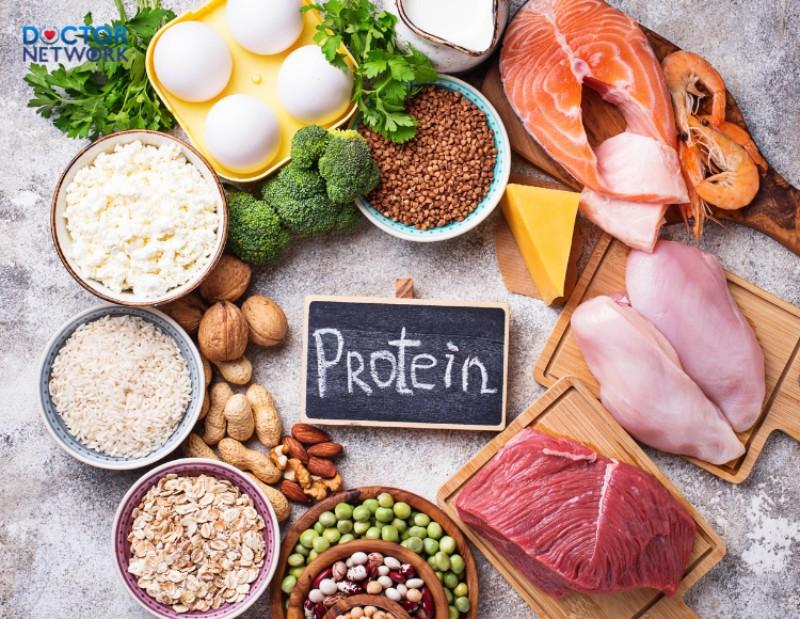To successfully lose weight, it is essential to reduce daily calorie intake, meaning a reduction in the amount of food consumed. However, many weight loss diets often lead to increased feelings of hunger and appetite, making weight loss challenging. This is a significant reason why individuals with overweight or obesity often struggle in their weight loss efforts. Let’s explore some strategies to reduce hunger and cravings during weight loss, as advised by Assoc. Prof. Nguyen Anh Tuan, MD, PhD.
1. Increase Protein Intake in Meals:
Consuming more protein can enhance the feeling of fullness, leading to reduced food intake in subsequent meals. For example, a study comparing two identical breakfasts with the only difference being eggs versus bagels found that participants who ate an egg breakfast reduced their body weight by 65% and body fat by 16% over an 8-week study period.

Supplementing with protein enhances the weight loss process
Supplementing your diet with sufficient protein can aid in weight loss by reducing overall hunger. Higher protein intake may also help prevent muscle loss during calorie reduction for weight loss.
2. Choose High-Fiber Foods – Strategies to reduce hunger:
Consuming foods rich in fiber can stretch the stomach, slow down emptying, and affect the release of hunger hormones. Including high-fiber foods in your diet is an effective strategy to reduce feelings of hunger. Fiber can ferment in the gut, producing short-chain fatty acids that promote a feeling of fullness.
Fiber-rich foods include Brussels sprouts, chickpeas, lentils, whole grains, fruits, vegetables, and various seeds.
3. Opt for Solid Foods Over Liquids:
The form of food, solid or liquid, can influence hunger differently. A recent review found that individuals consuming solid meals compensated for 38% fewer calories in the next meal compared to those consuming liquid meals.
In another study, participants eating a solid meal reported less hunger and desire to eat than those consuming a liquid meal. Solid foods require more chewing, providing more time for the brain to receive signals of fullness.
4. Drink Coffee to Reduce Appetite:
Using coffee to reduce appetite has several health benefits. Research indicates that coffee increases the release of peptide YY (PYY), a hormone produced in the gut that promotes a feeling of fullness in response to eating.
The precise mechanisms of how PYY works need further research, but the evidence suggests that coffee consumption might play a role in determining how much you eat.
5. Stay Hydrated:
Drinking water before meals is one of effective strategies to reduce hunger and promote weight loss. Studies show that individuals who consume two glasses of water before a meal eat 22% less than those who don’t drink any water.

Water aids in detoxifying the body and reducing the sensation of hunger
Drinking water can stretch the stomach and send signals of fullness to the brain. Adequate hydration also supports overall body function and helps reduce cravings.
6. Eat Slowly and Chew Thoroughly:
Mindful eating has been proven to reduce hunger and increase feelings of fullness. Avoid distractions like watching TV or using your phone while eating. Eating slowly and chewing your food thoroughly can decrease overeating.
Conscious eating has been shown to reduce calorie intake, prevent overeating, and contribute to weight management.
7. Enjoy Dark Chocolate:
Dark chocolate may help reduce cravings. The stearic acid in dark chocolate slows down digestion, contributing to a prolonged feeling of fullness. Smelling 85% dark chocolate alone has been observed to reduce both hunger and the desire to eat.
8. Consume a Bit of Ginger:
Ginger has various health benefits, including reducing appetite. A study found that consuming 2 grams of ginger powder dissolved in hot water in the morning significantly decreased feelings of hunger.
Adding ginger to your diet may contribute to appetite control and overall well-being.
9. Increase Spice in Your Meals:
Capsaicin, found in spicy peppers, and capsiate, found in sweet peppers, have been studied for their appetite-reducing effects. These compounds may help decrease hunger and increase feelings of fullness.
Additionally, the thermogenic effect of these compounds may increase calorie burning after meals. However, more research is needed to confirm these effects in all individuals.
10. Use Smaller Plates:
Downsizing the size of your plates can help reduce portion sizes and, consequently, food intake. Eating from smaller plates may lead to unconscious reductions in the amount of food consumed without increasing feelings of hunger.
11. Use Larger Forks;
The size of your eating utensils can significantly impact the amount of food needed to feel satisfied. Research has shown that individuals using larger forks ate 10% less than those using smaller forks.
The hypothesis is that smaller forks may make people feel less satisfied, affecting their perception of fullness. Note that this effect may not apply to all types of utensils.
12. Exercise Regularly:
Exercise is considered an effective way to reduce feelings of hunger. It can decrease the activation of brain regions related to appetite, leading to lower motivation to eat.
Regular exercise also helps lower hunger hormones and increase the feeling of fullness. Both rhythmic and endurance exercises have been shown to influence hormone levels and food intake similarly.
13. Reduce Body Fat Around the Waist:
Neuropeptide Y (NPY) is a hormone that affects appetite and energy balance in the body. Elevated levels of NPY can increase feelings of hunger and potentially alter calorie storage as fat.
Higher levels of body fat may contribute to increased production of NPY. Thus, reducing fat around the waist may help control appetite and hunger sensations.
14. Prioritize Adequate Sleep:
Getting enough sleep is crucial for appetite control and preventing weight gain. Studies have shown that inadequate sleep can increase feelings of hunger and cravings by up to 24%, while also reducing feelings of fullness.
Individuals getting less than seven hours of sleep per night reported lower feelings of fullness after breakfast by 26%. It’s noteworthy that insufficient sleep has also been linked to a higher risk of obesity.

Getting enough sleep is an effective measure to reduce hunger sensations and prevent weight gain
15. Manage Stress:
Excessive stress is known to elevate cortisol levels. While the effects may vary among individuals, high cortisol is generally associated with increased feelings of hunger.
Therefore, finding ways to manage stress can help control cravings and reduce the risk of obesity and depression.
16. Include Omega-3 Fatty Acids:
Omega-3 fatty acids, particularly those found in fish oil and algae, may increase leptin, a hormone that signals feelings of fullness. However, current evidence supporting these effects is primarily observed in overweight and obese individuals.
Further research is needed to determine if similar effects apply to lean individuals.
17. Choose Protein-Rich Snacks:
Snacking is a personal choice, and if it’s part of your daily routine, consider opting for snacks high in protein rather than those high in fat. Protein-rich snacks can enhance feelings of fullness and reduce overall calorie intake in subsequent meals.
For example, choosing a protein-rich yogurt for an afternoon snack may lead to consuming fewer calories during dinner compared to indulging in a high-fat cookie or a chocolate snack.
18. Visualize Eating Desired Foods:
According to some studies, visualizing yourself enjoying the foods you crave can significantly reduce the desire to eat them. Visualization exercises can trick your mind into believing you’ve consumed the desired foods, leading to a substantial decrease in cravings.
In conclusion, hunger is a vital and natural signal that should not be ignored. The mentioned strategies are simple strategies to reduce hunger between meals. If you have tried these methods and still find yourself excessively hungry, consider consulting with a healthcare professional for personalized advice.
Kiểm Duyệt Nội Dung
More than 10 years of marketing communications experience in the medical and health field.
Successfully deployed marketing communication activities, content development and social networking channels for hospital partners, clinics, doctors and medical professionals across the country.
More than 6 years of experience in organizing and producing leading prestigious medical programs in Vietnam, in collaboration with Ho Chi Minh City Television (HTV). Typical programs include Nhật Ký Blouse Trắng, Bác Sĩ Nói Gì, Alo Bác Sĩ Nghe, Nhật Ký Hạnh Phúc, Vui Khỏe Cùng Con, Bác Sỹ Mẹ, v.v.
Comprehensive cooperation with hundreds of hospitals and clinics, thousands of doctors and medical experts to join hands in building a medical content and service platform on the Doctor Network application.































